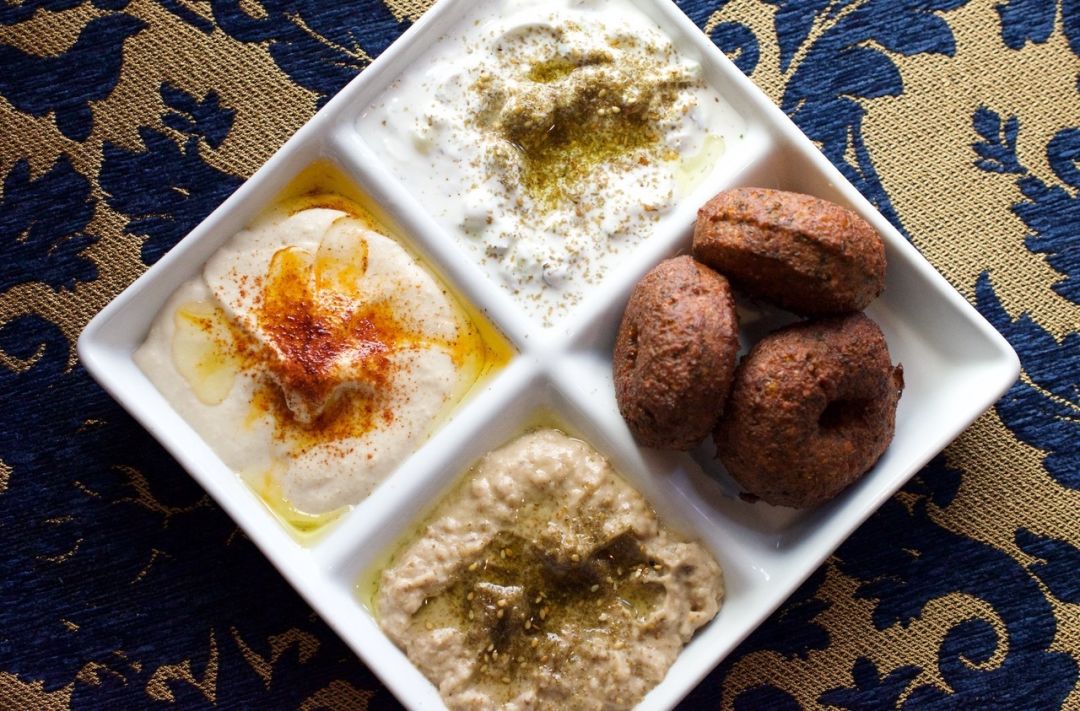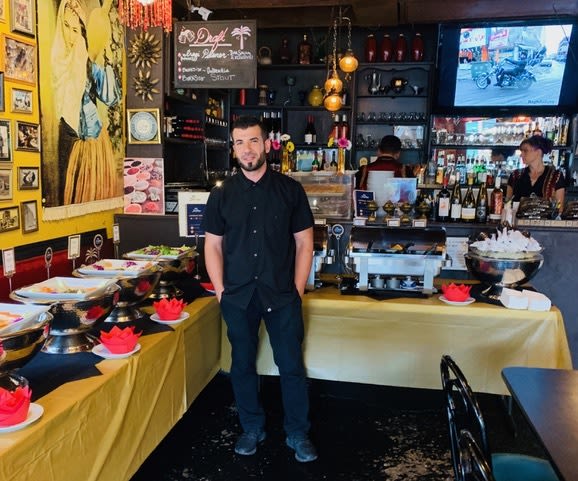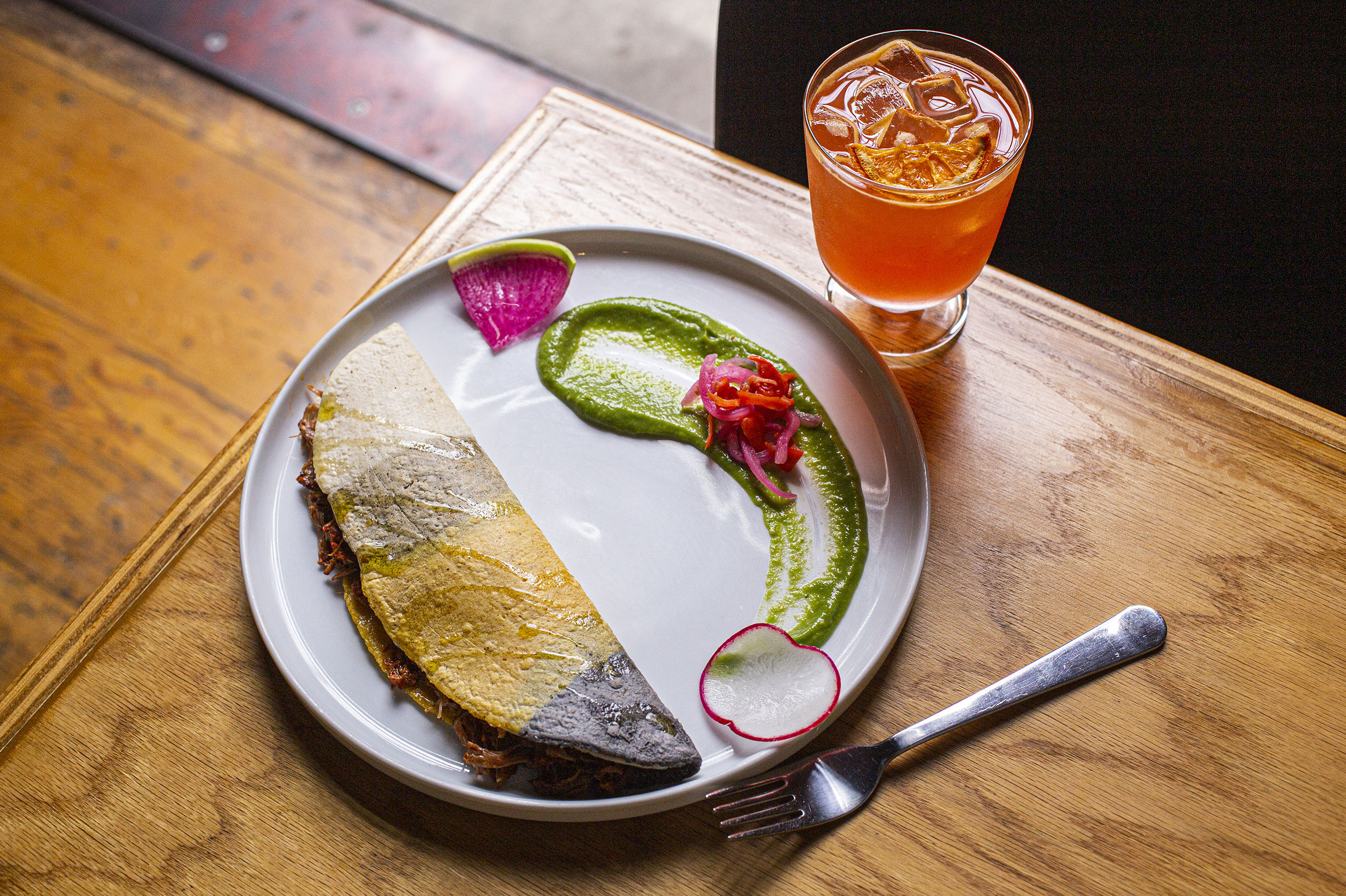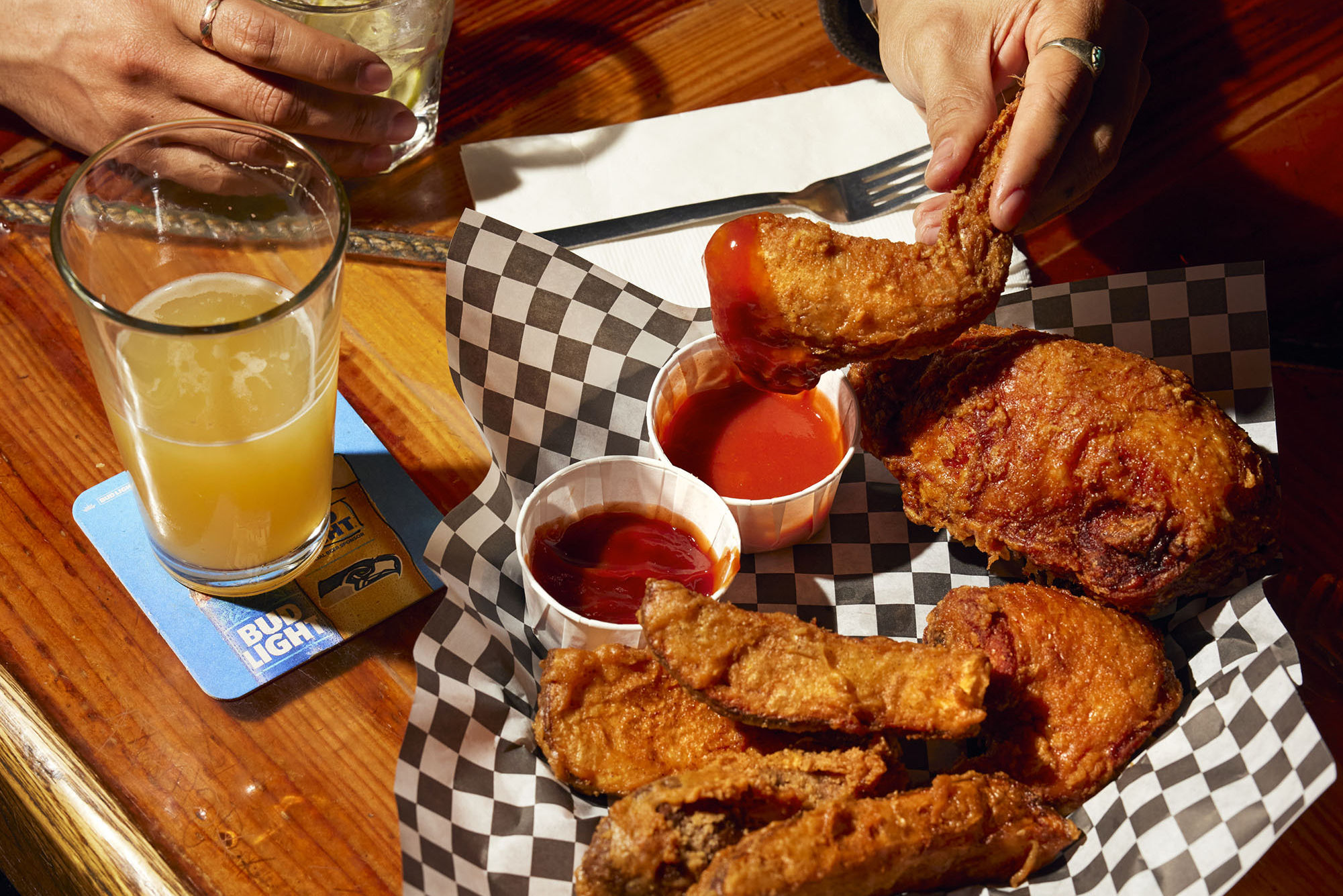DarSalam’s Ghaith Sahib on Life as an Iraqi Restaurant Owner during COVID-19

A falafel platter at DarSalam
Image: Ghaith Sahib
DarSalam’s falafel looks like a crispy, fried doughnut. The magic, as Voodoo Doughnut might say, is in the hole: a little tunnel of blissful crackle-crust that doubles the crunch factor. Arguably, it’s the best falafel in Portland. At least that debate was on the table over lunch on in February with my friend G Cody CQ Goldberg, at the place that planted the first Iraqi food flag in Portland, back in 2011.
Cody knows such things. His father was known as the Falafel King of Marin County. The guy coined the phrase “the taco from Morocco” in the 1970s and introduced West Coasters to the fried chickpea balls, an art he learned in Israel. Ever since, Cody, a falafel expert by birthright, has quested to find the best. In Portland, he insists, no places touches DarSalam. Brilliant, he calls the shape, which accounts for a rare feat in falafel-dom: the inside, often undercooked, is as perfect as the outside.

Ghaith Sahib at his restaurant, DarSalam
Image: Ghaith Sahib
The secret ingredient to DarSalam is 37-year-old owner Ghaith Sahib. When he comes by your table, as he often does, it’s easy to get hooked. He’s a sweet soul on this complicated planet; all graciousness and positivity despite enough page-turning backstories to fill a novel. He came to Portland 10 years ago, via a harrowing journey through India and Europe in search of a better life, barely surviving a car bomb, after being in the wrong place (his college in Bagdad) at the wrong time. In 2017, a decorated Marine was charged with a hate crime after refusing to order food and attacking a DarSalam waiter. The story and trial were the subject of a Serial-like podcast in New York Times’ The Daily, probing the lines between hate, fear, and PTSD. The surprising denouement to this story? A friendship blossomed between the two men, post-trial. “I forgave him,” Sahib says, “He’s now one of my best friends.”
Now comes another story for Sahib. A pandemic and an uncertain future, again. During a series of long, freewheeling phone interviews, he made one thing clear: Even a war survivor has never experienced anything quite like this. Over the course of the interviews, Sahib talked about his struggles to keep 20 family members afloat with little income while trying to figure out: what are the rules, what is the reality in the age of COVID-19?
Those conversations are captured in Sahib’s words. When he talks, his sentences often begin “Honesty.” Does he mean, “honestly?” Is this an unintentional language gap or an intentional word choice—one man’s search for truth? You decide.
In Iraq, men are not supposed to cook at home; that's the woman's job. My dad never touched the kitchen. But I loved cooking. I started at age 13 with eggs and potatoes. Eventually, I knew how to use all the spices; cumin, turmeric, cardamom. If my dad approved of a dish, I knew it was good.
After coming to Portland in 2010, my new American friends loved my cooking. Most had never eaten Iraqi food. They kept saying, “you should open a food cart!” So we did: my mom, dad, and me. We bought a trailer for $600. We had no idea what we were doing. Because of the war, everyone said, “Don’t call is Iraqi food. People might not come.” So we named it Aladdin's Castle Cafe. Some of our customers were American Iraqi war veterans, looking for authentic foods. TV channels came, too. It was great, free marketing!
We were so successful that a year later, we opened a restaurant on Alberta. But I changed the name to DarSalam, an Arabic word, which means “harbor of peace.” I just wanted to share my food, to show the peaceful side of Iraq. We filled it with photographs, my music, my culture. Five years ago, we added a second a downtown restaurant. We’ve never marketed our food. People can just feel it. I swear, honesty, it’s from the heart.
When the mandate came in mid-March, we closed both locations. My mom and sister were crying; it was so emotional. All of my family works at the restaurants, about 20 of us. My dad, who is 81, comes every day. We have a special chair for him. He likes to be involved. For three years, before it closed, my mom and I worked side by side in the food cart, 14 hours a day. For us, business is life, a joy, our soul.
In the first two weeks, I lost almost $40,000. I'm responsible for the whole family; for three houses; we have no other income. We still have to pay bills, insurance, taxes. I have some savings but worry about spending it. Every morning I say, “God please, let us have good news, find a vaccine.”
Growing up in Bagdad, we experienced war. We lived in fear. Survive or die. We worried, but we knew our enemy. I left after a car bomb exploded in front of me when I was a sophomore in college. I ended up in a coma for three weeks. It took six months to recover, and after that, I couldn’t live there more. But even my dad, who spent most of his life in Iraq, has never seen anything like this. He likes to encourage us, to say everyone will be okay. But it’s hard. His joy is the restaurant. He says to me, “If I can’t work, I'll be sick. That would be the end of me.”
Ten days ago, my dad said, “Ghaith, you have to do something. You have to open the restaurant.” I said, “Baba, I don’t know how to do it. Maybe some business owners are smarter than me.” We did open for takeout every day on Alberta, just me, my mom, and my sister, but honesty, we’re not selling much. We take most of it home to eat. Mostly, I'm keeping my family busy; something for my mom to do.
I applied for a grant and didn't get it. My accountant says the rules for a PPP loan aren’t clear. Honesty, we just want rules. What am I going to do with a loan right now? What employees? Downtown is dead.
I don’t know what reality is. People told me, “You can apply for $10,000 in free money on YouTube.” As soon as I entered my name and number on a web site, scammers started calling me. Thank god I didn't give my social security number. Another day, a friend texted me, “Hey, bro, I hear restaurants will back in business soon.” He said the president said it. Someone else said 25 states are reopening. What is true and what is not true? I worry about everything. I worry about my cats and dogs. I heard cats can get it, but dogs can't. I don’t know. Who do we trust?
I shop at Fred Meyer and it’s a nightmare. We’re in masks and gloves but the cashier is not. What are the rules? Nobody knows for sure. We need guidance; we need someone who has the wisdom. We are Americans. Help us.
Even if we hear we can reopen in two weeks, I’m sticking with to-go for now. Honesty, how do I bring in customers, serve plates, wash the dishes, and feel we are all safe? It’s too early to open.
I have so many dreams. My girlfriend and I were getting ready to buy a new house with a next-door food cart pod. A place to eat good food, listen to music, and drink Iraqi beer. Now, everything is on hold. I hope one day we will be out of this and can celebrate together. Yesterday, a customer spent $10 and tipped us $20. People want to support each other. That’s why I love Portland.




